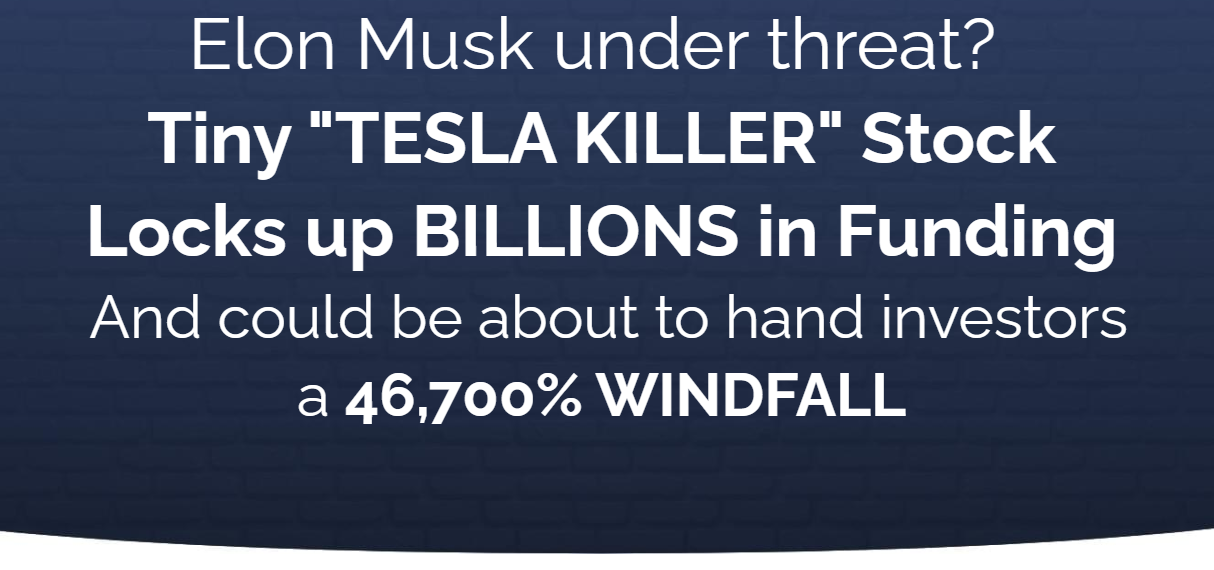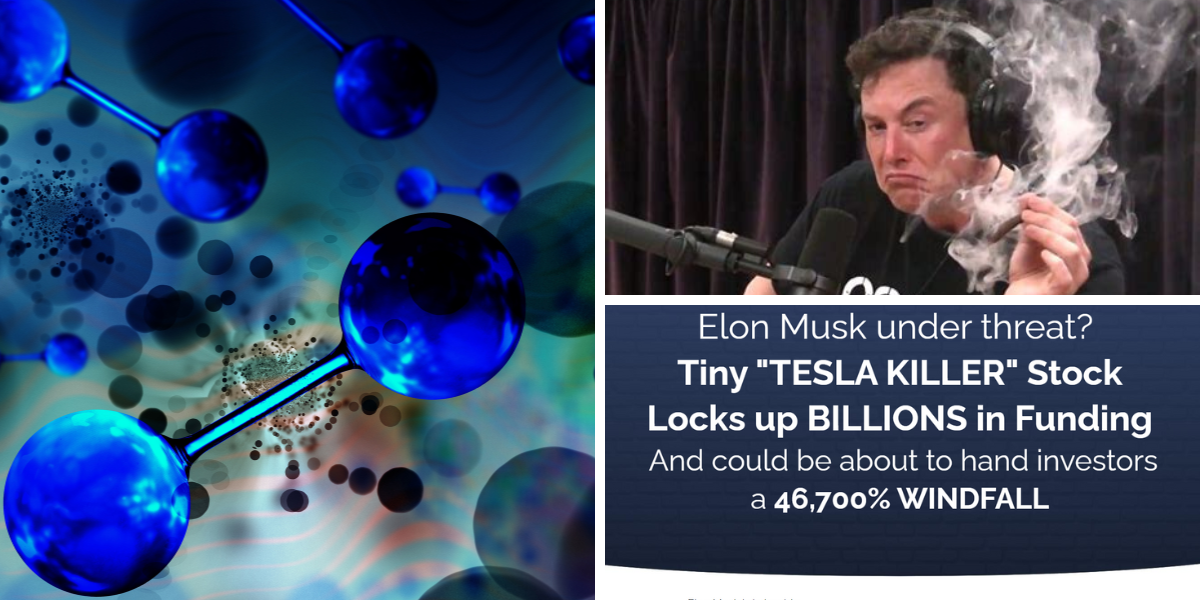Alex Reid says Elon Musk is in trouble.
This is because a tiny company has just developed a brand new type of “Future Fuel” that could put Tesla as we know it today, out of business.
The Teaser
Once respected, old-line media like Forbes, CNN, and even scientific journals like Nature are calling this company’s new fuel: “The Fuel of the Future.”

Alex Reid is the man behind investment research advisory Wealthpin Pro – the outfit behind this presentation. Prior to founding Wealthpin, Alex claims to have built a 7-figure investment portfolio by the time he was 29 by “aggressively pursuing investments in cutting edge technologies.” This is my first time reviewing something by him, but we have covered plenty of 'emerging technology' teasers here at Green Bull, including What the Heck is Imperium Technology? And The G.C.T. Technology Stock Luke Lango was teasing.
The presentation starts by saying that this story is far bigger than most investors realize. See, the Ukraine conflict that kicked off in February 2022 flipped the energy paradigm on its head.
When gas prices soared due to the artificial reduction in oil supply caused by the embargo of Russian oil, governments quickly woke up to the importance of energy independence.
But instead of cranking up domestic production of oil in the face of such a manufactured shortage, most governments are instead looking to ditch fossil fuels entirely by 2030 or later. Alex recognizes this trend and as a result, he predicts that in less than ten years, America will almost have entirely transitioned to this 100% clean Future Fuel, which can be produced anywhere, as long as there’s water and electricity.
Personally, I'm not sold on the timeframe, but Alex believes it's the real deal.
Reliable Power 24/7?
Unlike all the other forms of renewable energy, this “Future Fuel” is supposed to actually generate reliable power 24/7, regardless of whether the sun is shining or the wind is blowing.
And in contrast to nuclear energy, which produces dangerous radioactive waste, its only byproduct is water.
Even more impressive is that while battery-powered electric vehicles can take half a day to charge, this fuel refills cars in three minutes flat – 240x faster! This is where the Tesla killer part comes in.
Alex says there's only one company leading this “Future Fuel” revolution and he expects it to hand early investors even bigger returns than Tesla, EnPhase, and other multi-baggers of prior decades.
The Pitch
The name and ticker symbol of this company is revealed in a special report called Ride the Future Fuel Revolution for Life-Changing Gains.

The report is free with a membership to Alex's investment newsletter Wealthpin Pro, which costs only $49. Included in the offer are 12 monthly editions of the newsletter, two additional special reports, and a 100% money-back guarantee over an unspecified timeframe.
What on Earth is Future Fuel?
It's the most abundant chemical element in the universe, essential for life, and present in all living things. We're talking about Hydrogen.
Up until now, hydrogen has primarily been produced in two ways:
- Using heat and pressure to break down coal
- Burning natural gas with steam
This is how 95% of hydrogen is produced in America today.
But now there may be a better way. Instead of producing hydrogen from coal or methane, the “Future Fuel” company Alex is teasing uses this ingenious device, called an electrolyzer:

This laptop-looking widget uses electricity from sustainable sources to split hydrogen from the most abundant source on Earth – Water.
Clean Fuel With Unlimited Supply?
Being “clean” isn't the only advantage of “green hydrogen.”
Unlike renewable energy, it can be easily stored, and easily converted into usable energy. It’s non-toxic, so it doesn’t wreak havoc on the environment, and it doesn’t require the use of giant power plants fueled by radioactive uranium like nuclear energy.
But the biggest problem it is said to solve is that of supply.
Since it can be extracted from water, our most abundant resource, which makes up 71% of the Earth’s surface. It may also be the most abundant fuel source in the world.
These factors, along with its cost of production going down, are major reasons why many large corporations and entire industries are committing to phasing out fossil fuels entirely.
But going ‘all-in' on green hydrogen won't come without its own set of problems. For one, its low density makes it hard to store and being able to produce enough of it to service entire grids, still remains much more expensive than carbon fuels. This is why it remains one of several low-carbon fuels that could potentially take the place of fossil fuels one day, but this is far from a certainty.
So not exactly a lithium-ion battery killer that will impact Tesla over the short term like Alex's clickbait title would have you believe.
Nevertheless, Alex believes there isn't “a single industry hydrogen won't revolutionize” and there's one company at the forefront of it that is already rewarding early investors.
Revealing Alex Reid's “Future Fuel” Company
Here is everything we know about this business so far:
- Established itself as the leading developer of electrolyzers that produce green hydrogen from water over the past two decades.
- It is on track to deliver 500 tons of green hydrogen per day by 2025.
- 80% of this company’s customers are blue-chips, such as Amazon, Walmart, Home Depot, and others.
- The company's CEO is an experienced entrepreneur, who previously started and sold an electrical power products company for an estimated $130 million dollars.
Without a doubt, the company being teased here is Plug Power Inc. (Nasdaq: PLUG). This is what gave it away:
- A search for the second clue revealed that Plug expects to produce 500 tons per day of liquid green hydrogen in the US by 2025, equivalent to 4.3 million metric tons of carbon dioxide emissions.
- Their investor relations website boasts about having a “top-tier customer base” 80% comprised of blue-chip customers.
- Plug's CEO, Andrew Marsh was previously a co-founder of Valere Power, which he helmed from its inception in 2001 through to its sale to Eltek ASA in 2007 for roughly $130 million.
46,700% Windfall or All Hype?
Plug Power calls itself the first to commercialize hydrogen fuel cell technologies and it has some proof to back this claim up.
Its patented technology now powers thousands of industrial machinery like forklifts and the company has leveraged this early success to grow revenue 8x since 2013.
Some are calling green hydrogen an $11.7 trillion market and if Plug Power (which sounds like a plumbing company to me) is able to capture even a small portion of this, its current $6 billion market value will skyrocket. How likely is it that this happens?
Rather than duke it out for market share, its end-to-end green hydrogen ecosystem, from production, storage, and delivery to energy generation. Make it a potential candidate to be acquired by larger, multinational competitors with diverse energy operations that include electrolyzers and fuel cells, who want more vertical integration.
So 46,700% may be a slightly aggressive target, given Plug's market cap of $6 billion already. But any acquisition of the company would come at a healthy premium.
Quick Recap & Conclusion
- Alex Reid is promoting a brand new type of “Future Fuel” that could make other energy sources obsolete.
- It turns out, this new “Future Fuel” is actually Hydrogen, and with the cost of it now lower than ever before. One vertically integrated hydrogen company is set to reap the benefits.
- The name and ticker symbol of this company is only revealed in a special report called Ride the Future Fuel Revolution for Life-Changing Gains. It is ours with a subscription to Alex's investment newsletter Wealthpin Pro, which costs $49.
- Fortunately, we just saved you some time and a bit of money too by revealing Alex's pick for free as Plug Power Inc. (Nasdaq: PLUG).
- Plug Power is a vertically integrated, revenue-generating business with a blue-chip customer base. It is a viable acquisition prospect for a larger energy company.
Is Hydrogen the fuel of the future? Tell us why or why not in the comment section.

